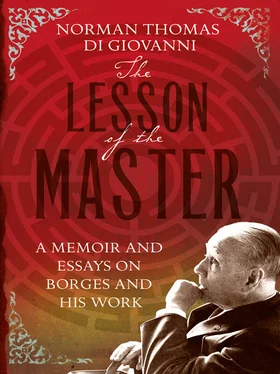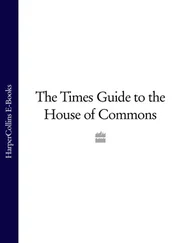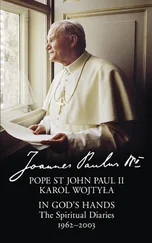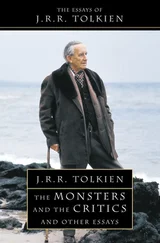The exercise in autobiography had twofold roots. The first of them was in the vexing problem just described, when Borges was denied the right to determine the form and fate of his own work. As our compromise volume took shape, I grew ever more convinced that it needed something in addition to our spanking-new translations if we were to avoid hoodwinking the public with yet another anthology of Borges’s work.
The second part of these roots and of the story is a happier affair and even funny. At the University of Oklahoma, several months earlier, I had been able to prevail upon Borges – not without great difficulty – to conclude his set of six lectures on Argentine literature by talking about himself. But on the afternoon of that final lecture he was in a blue funk. He had never before spoken about his own work publicly – it would never have occurred to him to indulge in such a pointless, immodest activity – and it was late in the day, and why on earth, and he simply was not going to be able to go through with it, etc. I saw I had a full-scale panic on my hands. By some strange chemistry, however, his panics always managed to turn the blood in my veins to iced water. It was a partnership, after all, and one of us had to be steady at all times. After our customary afternoon naps – his sleepless and unrefreshing, he claimed – I could see how pent up he was, so I suggested a walk. Our hotel stood about three-quarters of a mile from the campus on what seemed to be the edge of Norman, Oklahoma, where it occupied the corner of a perfectly square block. Arm in arm, Borges and I slowly circumnavigated that block. Once.
‘Just remember your Dickens,’ I told him. Twice.
‘David Copperfield,’ I told him, ‘“I was born on a Friday, at twelve o’clock at night.”’ And three times.
‘Nothing fancy, now. You’re telling a story, that’s all there is to it.’
Every once in a while, Borges’s lips began to move. ‘I was born in Buenos Aires, in 1899,’ he mumbled.
‘That’s the hang of it,’ I said.
He was unconvinced. I couldn’t tell him, but so was I.
Of course, he did marvellously, his audience loved it, and our Oklahoma sponsors, Lowell Dunham and Ivar Ivask, were duly pleased. Three months later in Buenos Aires, recalling the little triumph, I had a brainstorm and asked them at Norman to provide us with a transcript of the talk. I wrote to Macrae to tell him that we’d hit on an idea to beef up the book: we would add to it Borges’s story of his own life, written directly in English. The lecture, I knew, would come to around twenty pages; I figured that with a few days’ work we’d be able to flesh it out to thirty. So carried away was I that somewhere along the line I promised Jack we’d provide the book with a kind of appendix as well, also to be written in English, in the form of commentaries on each of the book’s twenty stories. I knew that readers were having difficulty with Borges; worse, I knew that the universities kept him swathed in unnecessary mystery. At the same time, since his stories were really all about himself, his various guises, and dimensions of his thought, what better setting for them by way of introduction than the story of his life?
The pages from Oklahoma reached us sometime in April 1970. By then, we had most of the stories translated and seemed to be on target. But reading the transcript of the lecture, my heart dropped down into my shoes. The talk started out like David Copperfield, all right, but it soon went jumping all over the place without order or logic. Sick with worry, I explained the predicament to Borges, for some reason or other fearing a negative response on his part. Instead, undaunted, and paraphrasing one of his favourite authors – English and nineteenth century, of course – he said, ‘Fling it aside and be free! We’ll start again from scratch.’
We did. On 21 April, the day after the typescript of El informe de Brodie went off to Emecé, we pitched in. That first day I took down five pages. I was prepared this time. I made us outline the material beforehand, breaking his life down into manageable chunks, chapters, of which we ended up with five. I made him stick to that outline. ‘No, no, don’t jump ahead to your mother; let’s get it all down about your father and his family first and then we’ll tackle her.’ It went like that. The next day, I took down five more pages; the day after that, six. At this rate, it was going to come out longer than hoped for, which was all to the good. And better than anything, it looked like being a piece of cake.
On the fourth day, there was a flood of visitors to see Borges at the library and he had a lecture to give at seven o’clock. ‘No work done,’ says the diary entry. The following week started with permission coming from Grove Press to allow us to make new translations of two vital stories, so we immediately tackled them, since it would permit Macrae to send a good portion of the typescript to the printer while Borges and I worked on. But alas! it was not to be so simple. What with the two translations to get out, a steady stream of visitors from abroad plaguing me, and Borges giving lectures on what seemed every other night, we got not one jot further on the story of his life until 16 May. That day we were down to three and a half pages, and it was not much good.
The fact of the matter was that Borges’s mind was on something else. It was at this point that he said to me, ‘I’ve committed what seems to me now an unaccountable mistake, a huge mistake. A quite unexplainable and mysterious mistake.’
He was, of course, referring to his rocky marriage to Elsa, and he was in a pit of despair. It was significant that 16 May was a Saturday. We hadn’t worked together on weekends for a very long time, yet here we were once more at the National Library. And it was not because of our deadline with Macrae – it was because Borges could no longer bear life at home. The marriage was not three years old. My diary records that on two days that week Borges had been too distraught for us even to attempt any work. What he needed was to talk about his private life, a thing that was so completely unlike him it only drove home to me the depths of his misery. Most of what he told me I already knew. He poured it out; I listened.
That Saturday was another turning point, for in the afternoon I invited a friend of ours, a lawyer from Córdoba who was in town that week, to tea at the Molino, the big old-fashioned confitería by the Congress that he was fond of. Two days later, he and I and Borges went to consult a friend of mine, a local lawyer. Between these two legal minds a bleak picture was painted. For starters, there was no divorce as such under Argentine law – only a form of legal separation that everyone referred to as divorce and that was as effective as any divorce but that did not allow for remarriage.
The next six weeks were an agony. As far as I could, I carried on with the autobiography by myself, typing up whatever dictation we had completed, doing the necessary background research, and checking facts and dates. One Saturday we actually managed to revise half the first chapter. But the next was devoted to drawing up a list of Borges’s marital grievances for the Córdoba lawyer. It was not until 28 May that the opening chapter was finished; not until 9 June that we had rewritten the second. We had begun working Sundays now too. But the trouble was that in addition to the delicate, surreptitious work on the legal front – endless meetings with a team of lawyers, countless errands and researching on their behalf – at one and the same time we had too many other matters clamouring for our attention. There were the proofsheets of El informe de Brodie to read. That stole three or so days’ time, and on the heels of that four more days were lost when we had to produce, in English, a thousand-word introduction to an encyclopaedia article for Grolier, the New York publisher, which was at least a year overdue. Macrae, getting understandably nervous, wanted to publish the stories without any of the new material, but I lied through my teeth and wrote to him that all was coming along fine. It was. What I failed to say was fine – but at a snail’s pace.
Читать дальше












